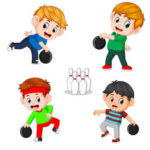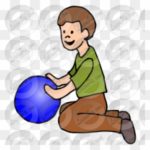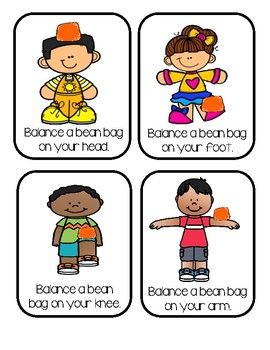
by Neetu | May 27, 2020 | Fitness Activity
Aim
- Experiment with different ways of tossing and then catching a bean bag with control
- Demonstrate underhand toss to hit a target with bean bag
Equipment Required
- Four cones for boundaries (same color).
- Spot marker for every kid.
- Music Player & pen drive.
- 1 bean bag per student.
Play Area Set-Up
Students scattered in the activity area, each with a bean bag.
Activity Description
Today we’re going to have fun exploring activities with Bean Bags. I will show you a movement activity and then you’ll repeat after me
With bean bag balancing on head, shoulders, or back:
- The balance on one foot. Shift to balance on the other foot.
- Sit and then stand again. If the beanbag falls, try again.
In plank position, slowly slide your feet around in a circle.
Wrap Up: (2 minutes)
What was the objective of your class? Can you tell me the shape of the beanbag? Color of beanbag?
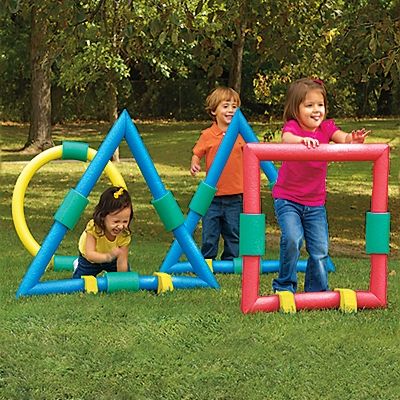
by Neetu | May 27, 2020 | Fitness Activity
Aim
- Use of soft touches on the noodle in order to keep it in personal space.
- Able to understand and demonstrate positions & movements using correct vocabulary
Equipment Required
1 noodle per student, 1 spot marker per student
Play Area Set-Up
- Create boundaries for a large activity area with large cones.
- Scatter spot markers throughout the area to create a home base for each student.
- Each student to get a noodle
Activity Description
Revise the concept of personal space and Reemphasize on working in personal space
Activity 1: Thread the Needle
While standing with legs widespread and have the students move the noodle (using both hands) into the space between the legs
- from front to back around one leg only
- repeat the same with other legs
- have them take turns around both legs making a figure of 8
- have then turned is around their neck & head
Activity 2: Car & Driver
Make it a partner game where one partner holds the noodle under each arm. Have the other student behind them holding the ends of the noodle. The person at the back is the driver; the person in front is the car. Practice safe moving without bumping into other cars played by fellow students. Have students switch jobs.
** Remind students NOT to excessively bend the noodles.
Challenges: You can spice it up and add challenges with noises or traffic commands.
Activity 3: Noodle Alphabet
Partners work together to spell simple words using their noodles and their bodies. Each pair will start on one end of the playing area. On the other side of the space, the teacher will place flashcards with vocabulary words. When the activity begins, one partner as time will jog and pick up a flashcard and bring it back. Once back together, the partners will work together to spell the vocabulary word one letter at a time. When the task is complete, the second partner will return the flashcard and pick up a new one. How many words can each team spell in a time designated by the teacher?
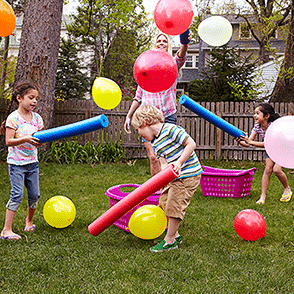
by Neetu | May 26, 2020 | Fitness Activity
Aim
- Work on developing hand/eye coordination and Striking Skills
- Get the batting & Throwing basics correct for Grip, Stance, Movement while making the shot.
Equipment Required
Cones, 1 Noodle & Balloon per student
Play Area Set-Up
- Create boundaries for a large activity area with large cones.
- Each student will need a bat (noodle) and a ball (balloon).
- Place spot markers or cones on the floor as goals.
Activity Description –
- Each student will need to find an open space for the activity. While in their open space, they will toss the ball (balloon) up in the air and attempt to hit it with their bat as it falls to the ground.
- Students may hit their balls in any direction. Once the ball is away from the hitter, the student will place their bat on the floor and carefully go and collect the ball then return home before swinging again.
Fun Activity: Beat the Bucket
A fast-paced game where strategy, agility, maneuvering skills, and strength are put to test. Teams are divided into batting and fielding teams where the batting team hit 3 balls continuously and runs between two cones to score while fielding team collects all ball and return to the bucket (a hoop) as quickly as possible and prevent the batting team to score as low as possible
In the game, each batting team member strikes 3 balloons by tossing one by one using the bat (noodle), and individual runs are noted. The final team score is calculated which becomes a chasing score for the bowling team.
If there are more than 2 groups, use 2 different play areas to ensure students do not have to wait for long.

by Neetu | May 25, 2020 | Fitness Activity
Aim
Learn how a “kangaroo” looks like when it is jumping and sitting on the ground.
Equipment Required
- Four cones for boundaries (same color).
- Spot marker for every kid.
- Music Player & pen drive.
- Skill Cards of kangaroo jump
Play Area Set-Up
Layout letter cards over a large area. Show students the area around the cards where they will be walking/running and other locomotor skills.
Activity 1: Kangaroo tag
- Demonstrate to children what a “kangaroo” looks like when it is jumping and what it might look like when it is still.
- Have all children stand up and show you their “kangaroo” jumping.
- Explain that the children will play a game called “kangaroo tag”.
- If you get tagged you must jump on the spot like a kangaroo until someone comes and “high fives” you.
- Ask children to spread out around the activity space.
- Choose 1 or 2 children to be “it”.
- When I start the music, the game begins. If I stop the music, everyone has to freeze like a kangaroo.
- Change who is “it” every 60 seconds
- Participate in yourself to provide an example for children who might need help.
Activity 2: Spot Jumping
Prerequisites – Students should understand the difference between a two-foot take-off (jump) and using one foot (hop).
- Students are scattered about the desired area.
- Each child begins the activity by standing on a spot.
- The teacher tells the students to move around the general space while using a certain locomotor skill when the music begins. (Walking is a good method to use at first to control the speed of movement in general space.) When the music stops, the students will stand on the closest spot.
- At this time, the instructor gives them a jumping or hopping task to perform. After about 15 seconds, begin the music again. Be sure to reinforce which type of locomotor movement the students may use during the music time.
Examples of jumping/hopping tasks:
1) Jump on and off the spot.
2) Hop on and off the spot.
3) Jump side to side over the spot.
4) Hop around the spot.
5) Jump forward and backward over the spot.
6) Hop around the spot.
7) Straddle jump the spot. (Both feet on, and both feet off.)
8) In a straddle position, jump side-to-side changing which foot lands on the spot.
9) Jump up in the air in a straddle jump and land with both feet on the spot.

by Neetu | May 25, 2020 | Fitness Activity
Aim
Warm-up activity with math integration and cardiovascular workout
Equipment Required
- Four cones for boundaries (same color).
- Spot marker for every kid.
- Music Player & pen drive.
- Small cones
Play Area Set-Up
- Cones are placed randomly around the playing area of the gym.
- Two teams are formed. One team is called “Bob the Builder”, the other team is named the “Bulldozers”.
Activity Description
When the music starts, the Bulldozers knock down as many cones as they can be using only their open hand (no kicking). At the same time, the Builders have to pick up the cones that are being knocked down. Students may not kick the cones and students also have to stop when the music stops or their team is penalized.
When the music stops, they must stop playing and return to their group. Whichever team has the most cones up or down wins.
The teams then change positions and we do it again.
Math Connection:
Before we actually count the cones, we ask the students to estimate or guess which team won. Are there more up? (Builders will win). Are there more down? (Bulldozers win).
After they have made their estimates, we count the actual number of cones up or down and find the winner.







